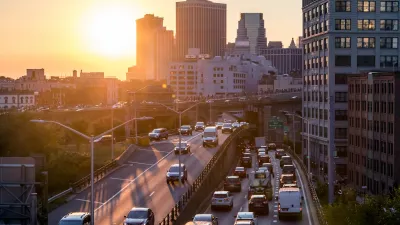Thinking about congestion as an economic problem generates new solutions for the problem as well as a response to accusations of social engineering.
A post on Urban Kchoze starts out by explaining traffic congestion using economic, rather than engineering, concepts. That discussion produces, however, a searing response to claims that transit investment, reduced parking requirements, and other progressive approaches to congestion are "social engineering."
First, the post describes some of the concepts of economics, like benefits and costs, which should be applied to the problem of congestion. Treating congestion as an economic problem allows new types of solutions, rather than the engineering approach of just creating more roadway capacity. Those solutions include "spatial and temporal redistribution of trips," "elimination of trips," and "favoring travel modes that are more space efficient."
The post also takes a moment to describe the resistance by two powerful players in the game of transportation planning to thinking about congestion on economic terms:
"One of the reasons why engineers don't like this vision, apart from the added complexity, is the "CHOOSE" part, and the availability of non-engineering policy solutions. Engineers are professionals taught to avoid partiality and who prefer to be neutral experts rather than militants for implementing given social policies, so considering non-engineering solutions makes them feel very ill at ease as they feel it exceeds their job mandate.
At the same time, politicians who don't have much vision may simply ask engineers to solve congestion issues, entrusting experts with solving their city's problems. This may create a situation where economic solutions are not considered as the experts asked to study the situation do not think they have been given the mandate to evaluate these policy solutions."
Then, helpfully to the political debates inspired by progressive transportation planning efforts, such as Mobility Plan 2035, recently approved (and sued) in Los Angeles:
"The idea of regulating or influencing individual behavior through policies based on economics often leads to accusations of social engineering. I just want to respond that neutrality in this case is essentially impossible. Streets and roads, by their very design, are public goods except for a few exceptions, as such, funding for them is determined by the public authority responsible for them. Therefore, that public authority is forced to make a choice, and the choice it makes will necessarily affect users' behavior and consumption of that good."
The article includes a closer examination of the implementation of several economics-based congestion strategies, including "letting congestion take care of it," a "congestion charge," "tolling high-speed roadways," "building low-cost, high-capacity, low-speed road networks," "limiting parking or increasing parking costs," and investing in rapid transit.
FULL STORY: Tackling congestion as an economic, not engineering, problem

Planetizen Federal Action Tracker
A weekly monitor of how Trump’s orders and actions are impacting planners and planning in America.

Chicago’s Ghost Rails
Just beneath the surface of the modern city lie the remnants of its expansive early 20th-century streetcar system.

San Antonio and Austin are Fusing Into one Massive Megaregion
The region spanning the two central Texas cities is growing fast, posing challenges for local infrastructure and water supplies.

Since Zion's Shuttles Went Electric “The Smog is Gone”
Visitors to Zion National Park can enjoy the canyon via the nation’s first fully electric park shuttle system.

Trump Distributing DOT Safety Funds at 1/10 Rate of Biden
Funds for Safe Streets and other transportation safety and equity programs are being held up by administrative reviews and conflicts with the Trump administration’s priorities.

German Cities Subsidize Taxis for Women Amid Wave of Violence
Free or low-cost taxi rides can help women navigate cities more safely, but critics say the programs don't address the root causes of violence against women.
Urban Design for Planners 1: Software Tools
This six-course series explores essential urban design concepts using open source software and equips planners with the tools they need to participate fully in the urban design process.
Planning for Universal Design
Learn the tools for implementing Universal Design in planning regulations.
planning NEXT
Appalachian Highlands Housing Partners
Mpact (founded as Rail~Volution)
City of Camden Redevelopment Agency
City of Astoria
City of Portland
City of Laramie





























